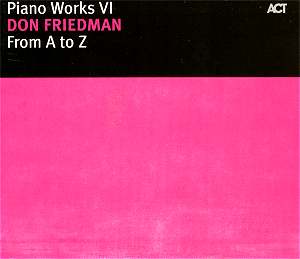Meant to be (Zoller) [5:12]
When It’s Time (Zoller) [5:22]
A Thousand Dreams (Zoller) [4:05]
Alicia’s Lullaby (Zoller) [5:34]
I Concentrate on You (Porter) [5:39]
Free Flow (Friedman) [5:03]
Memory of Scotty (Friedman) [6:08]
From A to Z (Friedman) [4:39]
Ask Me Now (Monk) [5:43]
Straight Ahead (Friedman) [3:28]
Blues for Attila (Friedman) [3:02]
rec. November 2005, Bauer Studio, Ludwigsburg,
Germany
Don Friedman is a pianist
who can draw on a rich and extensive experience
in a range of jazz styles. Born in 1935, he
has been active since the 1950s, making his
first recordings in 1955. He has since recorded
and worked with a roll call of big names,
names which serve to evidence his stylistic
flexibility – the trumpeters include Ruby
Braff, Bobby Hackett, Clark Terry and Don
Cherry, while the saxophonists include Harold
Ashby, Charles Lloyd, Eric Dolphy, Ornette
Coleman and Jimmy Giuffre!
Listening to him play solo
piano one is likely to think at times of both
Bill Evans and Art Tatum, for his harmonic
sense and his rippling runs and ornaments
respectively; but, in truth, Friedman has
the whole jazz tradition (and more than a
little of the classical tradition) at his
disposal.
Friedman dedicates this album
to the memory of one of his most important
musical associates, the Hungarian born guitarist
Attila Zoller (1927-1998); the first four
tunes here are compositions by Zoller and
the CD closes with Friedman’s own ‘Blues for
Attila’. Zoller was a subtle musician, whose
improvisations were often rather oblique and
understated, and something of those same qualities
are evident in Friedman’s treatment of his
compositions. ‘Meant to Be’ and ‘When It’s
Time’ are handled rhapsodically, and ‘Alicia’s
Lullaby’ gets a beautifully gentle reading.
The closing blues doesn’t wear its heart on
its sleeve – that isn’t Friedman’s way – but
its sincerity is evident and it builds to
a fitting monumental affirmation.
Elsewhere, Friedman’s treatment
of Cole Porter’s ‘I Concentrate on You’ is
an elaborate improvised structure which yet
remains faithful to the spirit of its original
amidst its elaborate counter melodies, and
the whole performance has a winning tenderness.
Friedman’s reading of Thelonious Monk’s ‘Ask
Me Now’ displays an assured understanding
of the way the tune works without ever settling
for mere imitation as he commutes Monk’s composition
to his own less angular idiom.
Friedman’s own originals
are all well-constructed vehicles for his
virtuosity as an improviser. On ‘Straight
Ahead’ there is some excellent two-handed
playing and ‘Free Flow’ is an attractively
impressionistic piece. ‘Memory of Scotty’
(a musical tribute to one of Friedman’s other
important friends and associates, the great
double bass player Scott La Faro) opens in
relatively simple elegiac fashion and builds
to a more complex conclusion, without ever
losing the original mood. The title track
is full of elaborate runs and figures, the
occasional unexpected harmony or percussive
accent interrupting the flowing runs to striking
effect.
This is not flashy or obviously
spectacular piano playing, but it is intelligent,
lyrical and full of feeling and is warmly
recommended.
Glyn Pursglove
